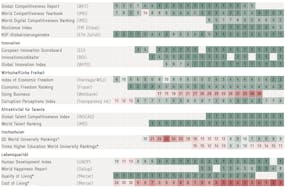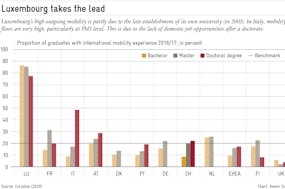The good news first: we are living longer and remaining healthier longer. At the same time, as a consequence of prosperity, women are having fewer children. The mean birth rates in Germany and Switzerland are 1.4 and 1.5 children per woman respectively. In France it is higher at 2.0. In none of the three countries, however, is this sufficient to maintain a constant size of population. Living longer in combination with a lower birth rate results in society getting older. Whereas in the past the family tree used to have the shape of a tapered trunk with a broad base, the generation structure is now more like a bamboo cane. This is having far-reaching impacts on solidarity between the generations both on a “small scale” within the family and on a “larger scale”, i.e. in the public system of social security.
One effect of living longer is a change in the pattern of illnesses. Thanks to medical advances, more people now survive heart attacks and cancers. On the other hand, they are suffering more from chronic disorders (such as Alzheimer’s). Providing care in such cases puts a big burden on partners and family members, often pushing them to their limits. As society ages in this way, it interferes with the contract between the generations, since the burden of care provision is spread over the shoulders of fewer and fewer volunteers (see diagram).
Once spouses and children are no longer able to help their elderly relatives, the latter need to be nursed by specialists in out-patient or in-patient care. There is a price to be paid for aging here too, since the pool of potential specialists is dwindling. In Switzerland the ratio of the active population to the extremely old is going to halve by 2030 and, by 2050, it is even going to fall to one third. The situation in Germany and France is going to follow a similar trend.

The final impact of societal aging is on the funding of old-age pensions, especially if these are designed as pay-as-you-go schemes. That is a principle whereby wage-based levies on people in gainful employment fund the pensions paid now to old-age pensioners. Around 73% of old-age pensions in France, 70% in Germany and 43% in Switzerland are financed in this way. More pensioners living longer are requiring financial support from fewer people in paid jobs. It is like squeezing more juice out of smaller lemons.
This is a challenge to society as a whole. The first reaction ought to be to encourage everyone to shoulder responsibility for themselves, by occupying housing suitable for their age and by making private provision (in both financial and health matters) for old age, thereby reducing dependence on future generations. Secondly, once the help of others becomes indispensible, the limits of the “immediate” family ought to be extended. Close cooperation with providers of out-patient services, sharing accommodation with other elderly persons and time exchange schemes mobilise new private resources or use them more efficiently. Thirdly, public money must be disbursed in a targeted manner. Ways of doing this might include, for instance, subject-oriented financing, i.e. financial support for beneficiaries and not for individual institutions in order to ensure that nursing and care services satisfy demand more efficiently. These three elements are important components in a sustainable contract between the generations. That is the only way that the bamboo cane that the demographic structure of our society has now become will be able to withstand the pressure of aging flexibly without instantly breaking.
This article was first published in the "metrobasel report 2013: metrobasel vision 2050".





